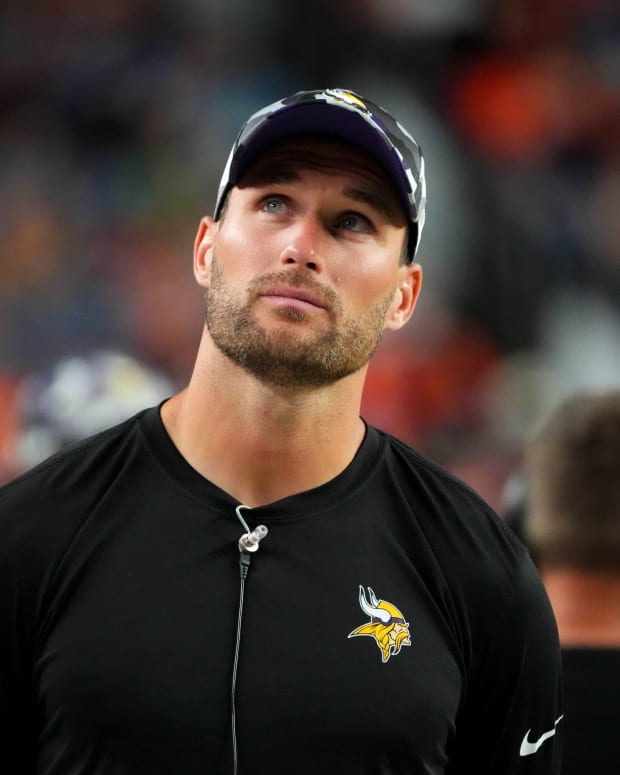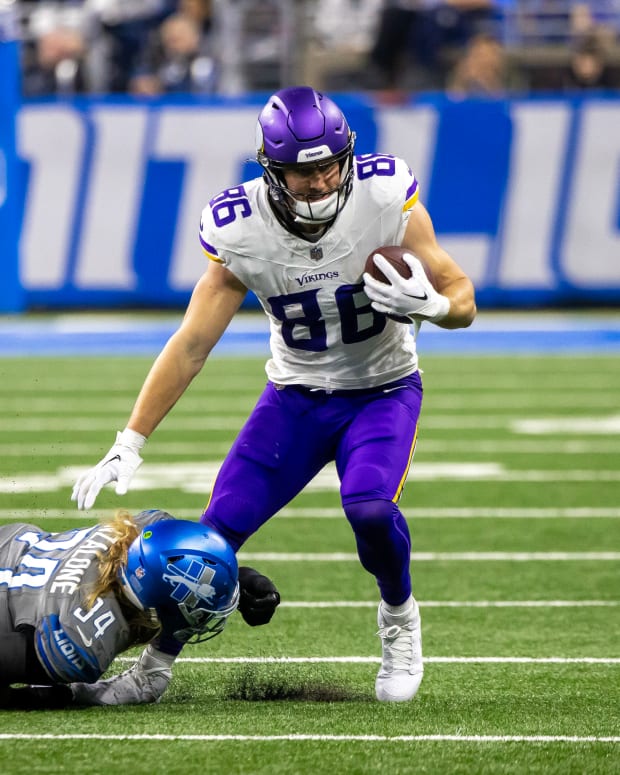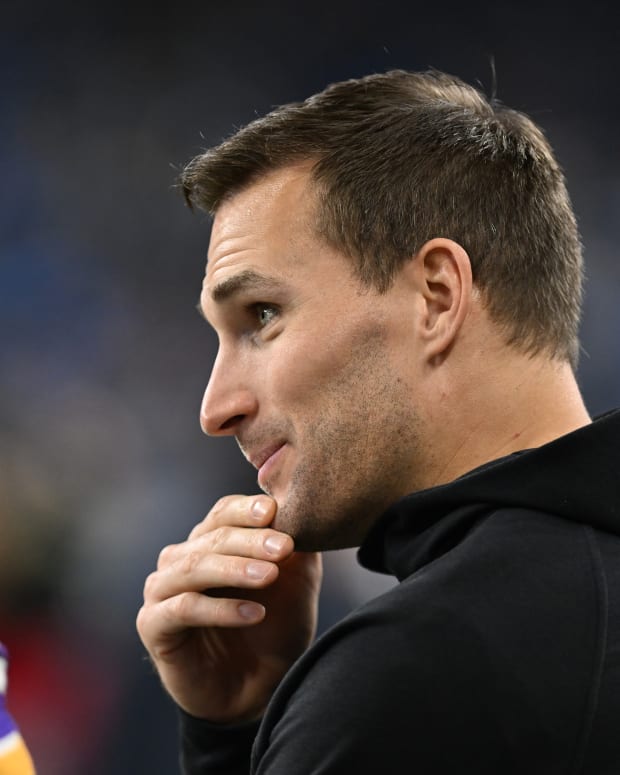The future of the Vikings, Part 1: Quarterback
New Minnesota Vikings head coach Kevin O’Connell did something in his first year that his predecessor was unwilling to do: Lean into Kirk Cousins. Not only from the perspective of being one of the NFL’s most pass-heavy teams but also on an intellectual level and emotional level.
The Vikings ended the regular season with the third most pass attempts, the highest ranking by any of Cousins’ teams (previous high was sixth in 2016). O’Connell put the offense at his QB’s fingertips with a more complex system and gave him more support, which seemed to increase Cousins’ confidence in big moments and capability to own a leadership role.
The results were…. interesting. The team produced its highest ranking in Expected Points Added through the passing game of Cousins’ tenure (sixth) but the offense struggled to consistently produce points, ranking 17th in scoring percentage per drive. The veteran QB’s individual numbers were down in some key areas like PFF grade, ESPN’s QBR and Adjusted Yards per Attempt but he also led eight game-winning drives and took the team to its first division title since signing in Minnesota in 2018.
Last offseason the Vikings signed Cousins to a short-term extension, kicking a decision on his future down the road. Well, that road has now taken them to a place where there have many options with the future at quarterback. Let’s have a look at the argument for all of the potential approaches they could take with Cousins this offseason…
The case for no extension
While you could make an argument for Cousins as one of the better quarterbacks in the NFL over the last five years, contract extensions aren’t about what you have done, they are about what you’re going to do in the future. Cousins will turn 35 next season and history suggests that betting on quarterbacks over the age of 35 is risky, unless they are an all-time legend.
Since 2000, the only 35-plus QBs to lead teams to 11 or more wins since Rich Gannon did it at 37 in 2002 are Peyton Manning, Aaron Rodgers, Tom Brady, Carson Palmer, Brett Favre, Drew Brees, Philip Rivers, Ben Roethlisberger and Eli Manning. If you extend the sample size to 10 wins, you add Kurt Warner and Trent Green’s 2005 season.
Cousins’ peers Russell Wilson and Matthew Stafford both ran into walls this season in their mid-30s. Matt Ryan went 4-12 in his age-35 season. Eli Manning was 3-12 by age 36.
You could argue that Cousins has been healthy and has never played a game that relied on spectacular physical gifts but he also led the NFL in hits taken and ranked fourth in times sacked.
The case against an extension would be rooted in Cousins being a difficult projection for the future. Age comes for everyone but we never know when a player is about to hit a wall. Joe Flacco was a New York Jet by age 35. Donovan McNabb was a Viking. Drew Bledsoe was retired. So was Jay Cutler.
Beyond age, the recent comparable long-term contracts are pretty scary. Last offseason Russell Wilson signed a deal worth $245 million with the Broncos with $165 million guaranteed including $124 million at signing. It’s not unreasonable to think Cousins’ agent will start there.
The Vikings could let Cousins’ deal play out with plans to replace him after 2024. That would give them another year to swing for the NFC North title with a clear timeline for hitting the reset button. It would also give GM Kwesi Adofo-Mensah and O’Connell an opportunity to draft their own QB and build around him while they are still on their initial contracts.
The no-extension option is not without pitfalls. Cousins is scheduled to have the sixth highest cap hit in the NFL next season and the only way to significantly lower that number is an extension. Also, does the team want a lame duck quarterback whose leadership is undermined by the franchise not buying into him? Would Cousins demand a trade if they won’t sign on after he led them to a division title? Would uncertainty around the QB position cause Justin Jefferson to delay signing a long-term extension?
Furthermore, what if Cousins is great in Year 2 of O’Connell’s system? The Vikings can’t use the franchise tag so they would either need to convince him to sign as a free agent at the absolute highest price or let him walk anyway.
Considering Cousins’ age and the Vikings’ roster needs, salary cap space and draft capital, it isn’t hard to make a theoretical argument in favor of letting his contract run out and beginning plans for the future. In practice, it is more tricky.
The case for a short-term extension
When the Vikings extended Cousins last offseason, they gave him the shortest term possible, giving them the opportunity to evaluate him and some long-term flexibility. They could do the same thing again — if Cousins agrees to it.
A short-term deal might look more like Derek Carr’s 2021 extension, which went for three years $120 million with $65 million guaranteed. The structure allowed the Raiders, who are expected to trade Carr this offseason, to get out of the deal after one year with just a $5.6 million dead cap hit. Doing the same with Cousins would give them immediate cap relief, allow them to have their QB under contract if he continues to play at a high level and give them option to move on if he shows signs of aging.
Adding two or three years to Cousins’ deal could allow for a true “competitive rebuild,” in which the Vikings could put their focus on adding talent to the beleaguered defense. It would also provide stability for Jefferson and an opportunity to build on what they started with the passing offense in 2022.
The downside to a short-term deal is that Cousins would still take up a sizable portion of the salary cap. The lowest percentage he’s taken up since 2016 is 10.6% (per OverTheCap). Would that be enough to turn the tide?
The organization also has to consider the big picture: They have only come up with one playoff win in five years with this model, which makes running it back even in the short term questionable. It’s a safe route that has been used twice since 2020 and they are yet to advance to the divisional round despite strong play from Cousins.
Would Cousins’ side accept a Carr-like contract? In the past, the team could argue that they hadn’t done enough winning with him under center but that changed this year, aside from the playoff game against the Giants, where he played well enough to win. When other QBs have gotten monster deals at his age, why wouldn’t Cousins argue that he is deserving as well?
The case for a long-term extension
The aforementioned quarterbacks who won beyond the age of 35 usually had something in common: They had some down years in between. Brees had a three-season stretch where he went 21-26 between ages 35-37 and then after the Saints rebuilt the roster around him Brees led the Saints to a 41-13 stretch from 2017-2020. Likewise Philip Rivers won just 18 of 38 games between ages 34-36 and then took the Chargers to a 12-4 season in 2018 and Colts to 11-5 in 2020. Kurt Warner went 8-18 over a three-year stretch from ages 34-36 with the Cardinals before taking them to a Super Bowl and then going 10-5 in 2009.
It’s possible for a team to work through some rebuild-y years with the same veteran quarterback and come out on the other side with a contending team. If the Vikings feel that the O’Connell-Cousins pairing is capable of producing more 13-win seasons in the future — even if there’s a down year in the interim — they could sign him to a five-year extension and aim to load up the rest of the roster around Justin Jefferson, Christian Darrisaw, Brian O’Neill and Danielle Hunter through the draft. Brees’s Saints hit on Michael Thomas, Alvin Kamara, Marshon Lattimore and counterbalanced his big contract with their rookie deals.
The trouble in comparing Cousins to Brees, Rivers and Warner is the success those QBs had prior to their late-career comeback charges. The Vikings have spent to the max of the cap for five straight seasons, made all-in moves consistently and given their QB some of the best receivers of the 21st century and it hasn’t panned out. Not to mention that if they miss on draft picks, they could just as quickly become to Falcons, who were stuck with Matt Ryan’s albatross contract that he signed in 2018 (and then went 25-39 before being traded to the Colts).
Inking a long-term deal on the hope for home runs in the draft and different results from an aging quarterback who isn’t as physically gifted as some of the other late-career legends doesn’t appear to be a high percentage play. It’s not impossible that it could succeed but very risky. It would also tie O’Connell and Adofo-Mensah to one quarterback for their entire contract lengths, which would be an unusual approach for new regimes.
The case for a trade
Cousins reportedly has a no-trade clause but it’s not clear what type of restrictions are involved. Should he agree to be moved, the argument for dealing him elsewhere begins with the timeline. If the Vikings decided that 2022 was their last big shot at a championship with Cousins as their QB, they could move on and go into rebuild mode like the Falcons or Seahawks did last offseason by moving Wilson and Ryan.
The return would likely be higher than the offers when the Vikings shopped Cousins last offseason because of the abundance of clubs that are desperate to improve under center. The Vikings could either plan to trade up for a QB in a draft where five QBs are expected to go in the first round or they could get a transition quarterback in free agency like the Falcons did with Marcus Mariota. Creating an immediate $17 million in cap space would allow them to make investments in free agency on the defensive side and the return in the form of draft picks would replenish picks that were moved in trades and give them a chance to hit on future starters to put around the QB position.
Trading Cousins feels like the most unlikely option because it would act as waving a white flag on 2023. The team might simply see too much talent to take a step back and enter uncertain waters at the universe’s most important position.
The case for drafting a QB
All of the options with Cousins except for the long-term extension could be paired with drafting a quarterback this year. There are numerous examples of teams picking QBs before they were absolutely forced to do so, whether it’s Brett Favre/Aaron Rodgers or Alex Smith/Patrick Mahomes or Joe Flacco/Lamar Jackson or Carson Wentz/Jalen Hurts.
Not that it would be easy to pick a quarterback with many other needs on the roster and no second round pick due to the TJ Hockenson trade but it would give the Vikings a chance to evaluate their young QB as a potential franchise player and possibly develop him behind Cousins for one year before turning the keys over and stacking the roster around him during his rookie contract.
Certainly drafting a QB comes with risk and pressure but teams that hit on their picks are rewarded with chances to compete for the Super Bowl. It also doesn’t hurt to give the next young player an offensive-minded coach, elite left tackle and All-Pro wide receiver to start with.
Conclusions
The Vikings’ brass faces its first true offseason and every decision revolves around what’s next for Kirk Cousins. How much they can spend, whether Jefferson signs an extension, how aggressive they are in rebuilding the defense quickly — all roads lead back to the QB and his contract.
None of the options are perfect or foolproof. If they believe that fortune favors the bold, we could see the front office make a trade or draft a QB but if recent history follows, we might expect to see them stick with Cousins on another extension.







